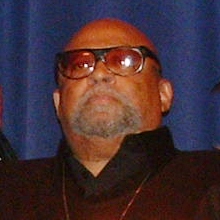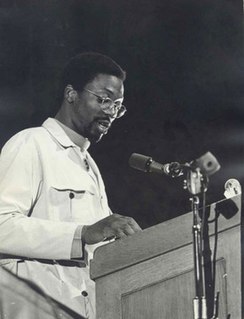Related Research Articles
Elaine Brown is an American prison activist, writer, singer, and former Black Panther Party chairwoman who is based in Oakland, California. Brown briefly ran for the Green Party presidential nomination in 2008. She withdrew from the party.

Maulana Ndabezitha Karenga, previously known as Ron Karenga, is an American professor of Africana studies, activist, and author best known as the creator of the pan-African and the African-American holiday of Kwanzaa.

The Black Power movement was a social movement motivated by a desire for safety and self-sufficiency that was not available inside redlined African American neighborhoods. Black Power activists founded black-owned bookstores, food cooperatives, farms, media, printing presses, schools, clinics and ambulance services. The international impact of the movement includes the Black Power Revolution in Trinidad and Tobago.

Alprentice "Bunchy" Carter was an American activist. Carter is credited as a founding member of the Southern California chapter of the Black Panther Party. Carter was shot and killed by a rival group, and is celebrated by his supporters as a martyr in the Black Power movement in the United States. Carter is portrayed by Gaius Charles in the 2015 TV series Aquarius.
US Organization, or Organization Us, is a Black nationalist group in the United States founded in 1965. It was established as a community organization by Hakim Jamal together with Maulana Karenga. It was a rival to the Black Panther Party in California. One of the early slogans was, "Anywhere we are US is." "US" referred to "[us] black people" in opposition to their perceived oppressors ("them").
James Forman, better known by his stage name James Mtume, is an American jazz and R&B musician, songwriter, record producer, activist and radio personality.

Kathleen Neal Cleaver is an American professor of law, known for her involvement with the Black Power movement and the Black Panther Party.
The Ten-Point Program or The Black Panther Party for Self-Defense Ten-Point Platform and Program is a party platform written by Huey P. Newton and Bobby Seale in 1966 for the Black Panther Party.
Black Power is a political slogan and a name which is given to various associated ideologies which aim to achieve self-determination for people of African descent. It is primarily, but not exclusively, used by African American activists and proponents of what the slogan entails in the United States. The Black Power movement was prominent in the late 1960s and early 1970s, emphasizing racial pride and the creation of black political and cultural institutions to nurture, promote and advance what was seen by proponents of the movement as being the collective interests and values of Black Americans.

The Black Panther Party (BPP), originally the Black Panther Party for Self-Defense, was a Black Power political organization founded by college students Bobby Seale and Huey P. Newton in October 1966 in Oakland, California. The party was active in the United States between 1966 and 1982, with chapters in numerous major cities, and international chapters in Britain and Algeria. Upon its inception the Black Panther Party's core practice was its open carry armed citizens' patrols ("copwatching") to monitor the behavior of officers of the Oakland Police Department and challenge police brutality in the city.
Black nationalism is a type of nationalism or pan-nationalism which espouses the belief that Black people are a race and seeks to develop and maintain a Black racial and national identity. Black nationalist activism revolves around social, political, and economic empowerment of Black communities and people, especially to resist assimilation into white culture and maintain a distinct black identity.

Hakim Abdullah Jamal was an American activist, who was a cousin of Malcolm X and later became an associate of Michael X. Jamal wrote From the Dead Level, a memoir of his life and memories of Malcolm X. During his life, Jamal was romantically involved with several high-profile women, notably Jean Seberg, Diana Athill, and Gale Benson.

Ericka Huggins is an American activist and educator. She is a former leading member of the Black Panther Party.

The United Front Against Fascism (UFAF) was an anti-fascist conference organized by the Black Panther Party and held in Oakland, California, from July 18 to 21, 1969.
Revolutionary Action Movement (RAM) was a US-based revolutionary black nationalist group in operation from 1962 to 1969. They were the first group to apply the philosophy of Maoism to conditions of black people in the United States and informed the revolutionary politics of the Black Power movement. RAM was the only secular political organization which Malcolm X joined prior to 1964. The group's political formation deeply influenced the politics of Huey Newton, Bobby Seale, and many other future influential Black Panther Party founders and members.
Waldo E. Martin is an American historian.

Raymond "Masai" Hewitt was an American civil rights activist who was one of the leading members of the Black Panther Party.

Constance Evadine Matthews, better known as Connie Matthews, was an organizer, a part of the Black Panther Party between 1968 and 1971. A resident of Denmark, she helped co-ordinate the Black Panthers with left-wing political groups based in Europe.

Black against Empire: The History and Politics of the Black Panther Party is a 2013 book focusing on the history of the Black Panthers. It is written by Joshua Bloom and Waldo Martin.
References
- ↑ Joshua, Bloom; Martin, Waldo (2016). Black Against Empire: The History And Politics Of The Black Panther Party. University of California Press. p. 41.
- ↑ Scot Brown, Fighting for US: Maulana Karenga, the US Organization, and Black Cultural Nationalism NYU Press, 2003
- ↑ James Edward Smethurst, The Black Arts Movement: Literary Nationalism in the 1960s and 1970s, University of North Carolina Press, 2005
- ↑ Joshua Bloom, Waldo E. Martin Jr. Black against Empire: The History and Politics of the Black Panther Party, Univ of California Press, Oct 25, 2016
- ↑ Freedom North: Black Freedom Struggles Outside the South, 1940-1980 J. Theoharis, K. Woodard, Springer, Mar 5, 2016
- ↑ Jessie Carney Smith, Black Firsts: 4,000 Ground-Breaking and Pioneering Historical Events, Visible Ink Press, Dec 1, 2012
- ↑ Scot Brown, US: Maulana Karenga, the US Organization, and Black Cultural Nationalism NYU Press, 2003